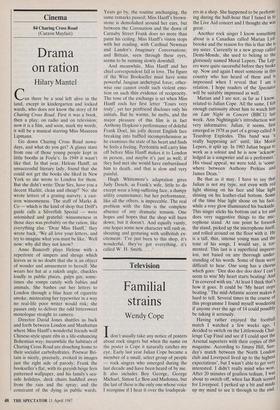Cinema
Drama on ration
Hilary Mantel
Can there be a soul left alive in the land, except in kindergarten and locked wards, who does not know the story of 84 Charing Cross Road. First it was a book, then a play; on radio and on television; now it is a film, and soon, mark my words, it will be a musical starring Miss Maureen Lipmann.
Go down Charing Cross Road nowa- days, and what do you get? A glassy stare from one of those young people kept in little booths in Foyle's. In 1949 it wasn't like that. In that year, Helene Hanff, an unsuccessful literary lady, found that she could not get the books she liked in New York so she wrote to London for them. But she didn't write 'Dear Sirs, have you a decent Hazlitt, clean and cheap?' No: she wrote letters of a grating naivety, a cast- iron winsomeness. The staff of Marks & Co — which is the kind of shop that Driffs guide calls a Silverfish Special — were astonished and grateful: winsomeness in those days was probably on the ration, like everything else. 'Dear Miss Hanff,' they wrote back, 'We all love your letters, and try to imagine what you must be like.' Well now: why did they not know?
Anne Bancroft plays Helene with a repertoire of simpers and shrugs which leaves us in no doubt that she is an object of wonder and amusement to herself. She wears her hat at a rakish angle, chuckles loudly in public places, gulps gin; some- times she romps cutely with babies and animals. She bashes out her letters to London through a blue haze of cigarette smoke, mistreating her typewriter in a way no real-life poor writer would risk; she pauses only to deliver the odd bittersweet monologue straight to camera.
Director David Jones shuttles us back and forth between London and Manhattan where Miss Hanffs wonderful friends wolf Chinese-style spare ribs in a life-enhancing Bohemian way; meanwhile the habitués of Charing Cross Road are slouching home to their socialist carbohydrates. Postwar Bri- tain is nicely, precisely, -evoked in images just the right side of parody; Frank the bookseller's flat, with its greyish beige fern patterned wallpaper, and his family's sea- side holidays, deck chairs huddled away from the rain and the spray; and the constraint of the dying in public wards. Years go by, the routine unchanging, the same remarks passed; Miss Hanffs brown- stone is demolished around her ears, but between the Coronation and the dawn of Carnaby Street Frank does no more than paint his ceiling. Miss Hanffs vision stops with her reading, with Cardinal Newman and Landor's Imaginary Conversations; and Britain, seen through these eyes, seems to be running slowly downhill.
And meanwhile, Miss Hanff and her chief correspondent fall in love. The figure of the Wise Bookseller must have some powerful Jungian archetypal force; other- wise one cannot credit such violent emo- tion on such thin evidence of reciprocity. The tone of the exchange is set when Miss Hanff ends her first letter 'Yours very truly', yet her penfriend discloses only his initials. But he warms, he melts, and the major pleasure of this film is in fact Anthony Hopkins's performance of doleful Frank Doe, his jolly decent English face breaking into baffled incomprehension as he examines the state of his heart and finds he feels a feeling. Peritonitis will carry him off before Miss Hanff makes it to London in person, and maybe it's just as well; if they had met she would have embarrassed him to death, and that is slow and very painful.
Hugh Whitemore's adaptation gives Judy Dench, as Frank's wife, little to do except wear a long-suffering face, a dumpy utility countenance; but her performance, like all the others, is impeccable. The real problem with the film is the complete absence of any dramatic tension. One hopes and hopes that the shop will burn down; but it doesn't. And eqtially vainly, one hopes some new character will rush in, shouting and gesturing with unBritish ex- citement: 'I've just been to this shop, it's wonderful, they've got everything, it's called W. H. Smith. . .
























































 Previous page
Previous page